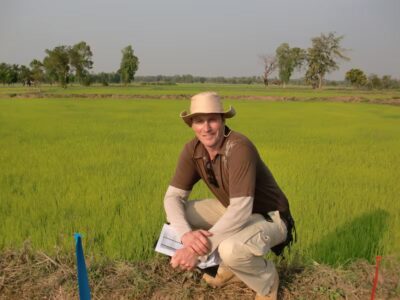A project in Rwanda has shown how farmers can produce more from crops simply by using modern and higher quality varieties of seeds.
In one case, farmers were able to grow up to 10 times as many carrots on the same plot of land by swapping old seeds for new, more suitable versions.
With more extreme weather and new diseases hitting crops, the project seeks to make farmers more resilient, bolster food security and adapt to the effects of man-made climate change.
The “seed resilience” project, launched in 2023, also aims to help farmers make better use of natural resources and help feed a rising global population.

“It was a simple, basic idea,” Ben Rivoire, sustainability and crop value manager for the International Seed Federation (ISF), told The National on the sidelines of the Cop29 climate talks in Baku, Azerbaijan.
“We just created a trial in a field on a farm where instead of having just one or two varieties that they were using for many years, we put those two in comparison with … other varieties for five different crops.”
Trials were conducted in open fields and greenhouses near the capital Kigali spanning 2,200 sq metres, with the greenhouse area 600 sq m.
Varieties of carrot, cabbage, tomato, sweet pepper and onion were tested. The yield for all increased but the carrots were the best performer.
Yields on carrots (based on 90,000 plants per 0.1 hectare) on one plot surged from a national average of 1,332kg to 13,071kg.
Mr Rivoire warned that this would not always be the case but on average there was a six-fold to nine-fold increase. Full results are expected this month.
The project was a collaboration between the Rwanda agriculture and animal resources development board (RAB), the Fair Planet NGO and the ISF, which represents seed companies.
The seeds were sourced from companies regionally and abroad and were better adapted to conditions in Rwanda. It is a complex area but new seeds can be sourced from seed banks or cross bred with other varieties to suit unique conditions on the ground.
These seeds, which are not genetically modified, are also better able to withstand pests, don’t require as much water, need reduced levels of fertiliser and deliver bigger yields.
More than 60 were examined and more than 20 found the most suitable were planted.
Many think of new agricultural practices as smart farming involving hydroponics, vertical farms and drones to plant crops, but encouraging farmers to access new seeds is also crucial.
“We know there are a lot of discussions about sustainable farming practices, and we know that the population is increasing and that growing conditions are changing,” said Mr Rivoire. “That’s why you need this innovation stream, where seed companies are providing some solutions together with others.”
UN figures show about a third of all human-caused greenhouse gas emissions are linked to food. The largest part of this comes from agriculture and land use such as using certain fertilisers for crop production cutting trees for more farmland.
“All industry has a role to play when it comes to mitigation of climate change,” he said. “We want the agricultural sector to take part in the discussion and also take responsibility in the way we all together … help reduce the global emissions.”
According to the ISF, about 80 per cent of the world’s food comes from seeds. Improved varieties of seeds often remain out of reach to most farmers in Africa but the aim, through these types of projects, is to enable access to high-quality seeds and improved varieties which allow farmers, particularly smallholders, to grow more without needing more land.
The ISF, which operates across the world and this year marks 100 years in existence, is trying to help establish a seed supply chain and ultimately help the private sector’s contribution to empowering farmers, especially smallholders, and enhancing their seed choice.
“We don’t necessarily think about this connection between the tomato we eat on our plate and the innovation that is needed at the beginning by some companies to spend the millions of dollars over 10 or 15 years to develop these specific varieties.”
It now is hoped to extend the trials to reach 84,000 farmers across the country.
“In a rapidly changing environment, it is crucial to develop crop varieties tailored to the specific needs of smallholder farmers,” said Dr Alon Haberfeld, operations and technology manager at Fair Planet. “[This empowers] smallholder farmers to achieve high yields even under shifting climate conditions.”
Food security and boosting resilience has become a more prominent part of Cops. At Cop28 in Dubai a UAE declaration on sustainable agriculture, resilient food systems and climate action has now been endorsed by about 160 countries.
Tuesday is dedicated to “food, agriculture and water” at Cop29, with a series of events planned and announcements expected.
The Cop29 presidency is also working on initiatives for farmers and reducing methane.



